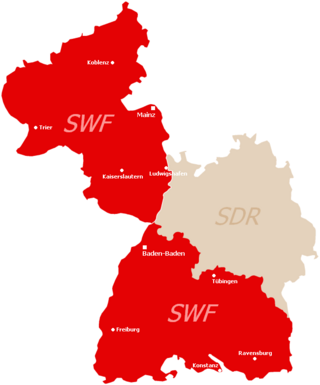
ARD is a joint organisation of Germany's regional public-service broadcasters. It was founded in 1950 in West Germany to represent the common interests of the new, decentralised, post-war broadcasting services – in particular the introduction of a joint television network.
Mitteldeutscher Rundfunk, shortened to MDR, is the public broadcaster for the federal states of Thuringia, Saxony and Saxony-Anhalt in Germany. Established in January 1991, its headquarters are in Leipzig, with regional studios in Dresden, Erfurt and Magdeburg. MDR is a member of the ARD consortium of public broadcasters in Germany.
Television in Germany began in Berlin on 22 March 1935, broadcasting for 90 minutes three times a week. It was home to the first regular television service in the world, named Fernsehsender Paul Nipkow.

Norddeutscher Rundfunk, commonly shortened to NDR, is a public radio and television broadcaster, based in Hamburg. In addition to the city-state of Hamburg, NDR broadcasts for the German states of Lower Saxony, Mecklenburg-Vorpommern and Schleswig-Holstein. NDR is a member of the ARD organisation.
Radio Bremen, shortened to RB is Germany's smallest public radio and television broadcaster and the legally mandated broadcaster for the city-state Free Hanseatic City of Bremen. With its headquarters sited in Bremen, Radio Bremen is a member of the consortium of German public broadcasting organizations, ARD.

Rundfunk Berlin-Brandenburg, commonly shortened to RBB, is an institution under public law for the German states of Berlin and Brandenburg, based in Berlin and Potsdam. RBB was established on 1 May 2003 through the merger of Sender Freies Berlin (SFB) and Ostdeutscher Rundfunk Brandenburg (ORB), based in Potsdam, and is a member of the Association of PSBs in the Federal Republic of Germany (ARD).

In Bavaria and in Württemberg-Baden, Radio München (Munich) and Radio Stuttgart went on air in 1945. In the next years, Radio München was transformed to a Bavarian broadcaster, and in Germany's South West, two public broadcasting corporations started and produced radio and (subsequent) television programs up to their merger in 1998:

ARD alpha is a German free-to-air television channel run by regional public-service broadcaster Bayerischer Rundfunk. Its programming consists of shows made by Bayerischer Rundfunk, as well as from ARD and Austrian broadcaster ORF. The channel was originally called BR-alpha, but was rebranded as ARD-alpha on 29 June 2014.
Bayerischer Fernsehpreis is an award presented by the government of Bavaria, Germany since 1989. The prize symbol is the "Blue Panther", a figure from the Nymphenburg Porcelain Manufactory. The prize money is €10,000.
Germany was represented at the Eurovision Song Contest 1989 with the song "Flieger", composed by Dieter Bohlen, with lyrics by Joachim Horn-Bernges, and performed by Nino de Angelo. The German participating broadcaster on behalf of ARD, Bayerischer Rundfunk (BR), selected their entry through a national final. This year marked the last contest in which participation and televoting were only open to residents of West Germany.
Scheibenwischer was the name of a long-running German Kabarett show. It was founded in 1980 by Dieter Hildebrandt and produced by BR / RBB to be broadcast on Das Erste. The show ended in 2008 after 28 years on the air.
Germany was represented at the Eurovision Song Contest 1983 with the song "Rücksicht", composed by Michael Reinecke, with lyrics by Volker Lechtenbrink, and performed by duo Hoffmann & Hoffmann. The German participating broadcaster on behalf of ARD, Bayerischer Rundfunk (BR), selected their entry through a national final. In addition, BR was also the host broadcaster and staged the event at the Rudi-Sedlmayer-Halle in Munich, after winning the previous edition with the song "Ein bißchen Frieden" by Nicole.

Thomas "Thomy" Aigner is a former Austrian TV entertainer and a current documentary film producer and lecturer.

BR24 is a television news program produced and airing on BR Fernsehen. It started airing on October 1, 1979. Originally intended as a regional-oriented program, BR24 Rundschau later include reports from around Germany which also appeal to viewers in other states. BR24 reports updates from Bavaria, Germany and the world.

Bayern 1 is a German public radio station in Bavaria, owned and operated by the Bayerischer Rundfunk (BR).

BR24 is a cross-platform news brand of German public broadcaster Bayerischer Rundfunk (BR) which is at the same time a news website, a 24/7 news radio station and a television news programme.

Helmar Rudolf Willi Weitzel is a German television presenter, journalist and film producer. He moderated the television programs Willi wills wissen and Willis VIPs. In 2008 he made the movie Willi und die Wunder dieser Welt. Other TV shows he hosted were Willis Quiz Quark Club, Willi wills wissen – Gute Frage, nächste Frage!, Willi wills wissen von A–Z and Ein guter Grund zu feiern. Since 2013 he has been on the road in Germany with his live program Willis wilde Wege. Since January 2018 he has moderated the magazine Gut zu Wissen on BR Fernsehen.
Andreas Bachmann is a German journalist. He is editorial director of the editorial department Rundschau (BR24) and Landesberichte on BR television and an election expert for Bayerischer Rundfunk. In the past, he was, among other things, moderator of the ARD political magazine report Munich as well as moderator and editorial director of the BR political magazine Kontrovers.

Sandra Rieß is a German radio and television presenter. After studying at the University of Bayreuth, Sandra Rieß was cast by Bayerischer Rundfunk in 2010 and became the presenter of the television show On3-südwild. She moderates and hosts various events and television shows.














